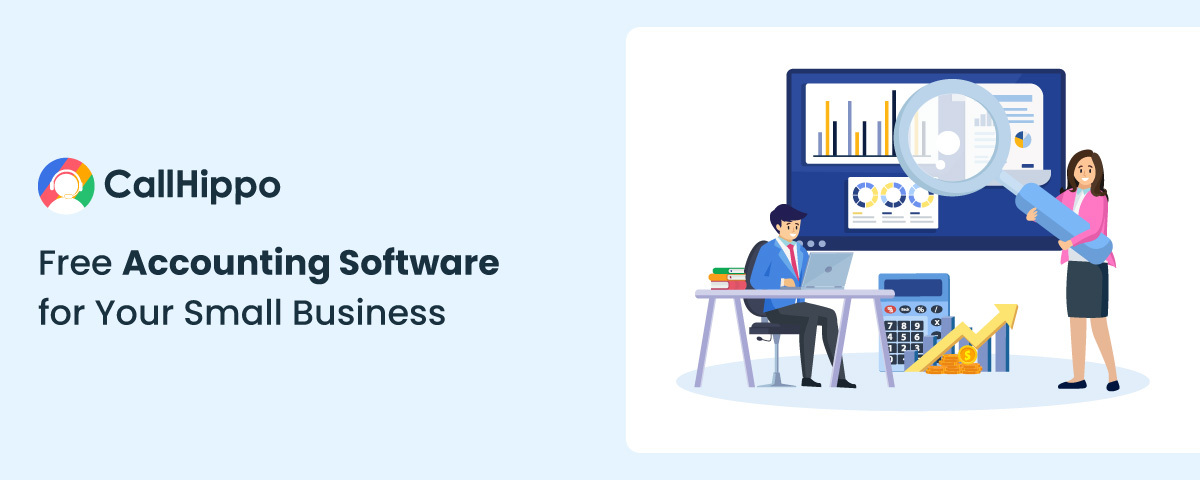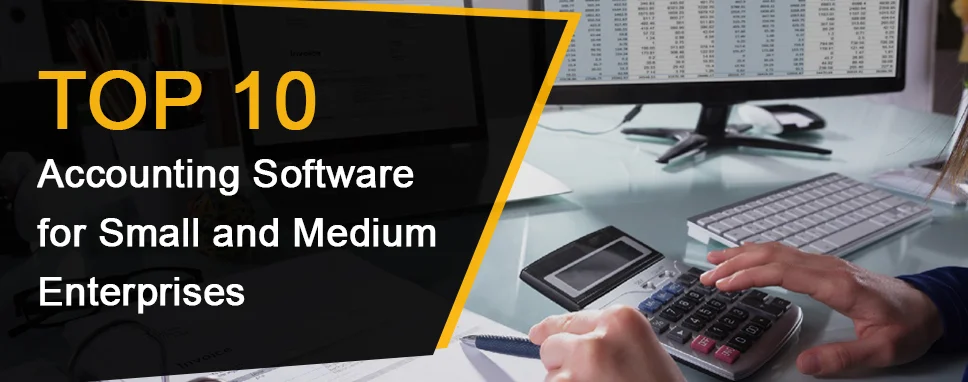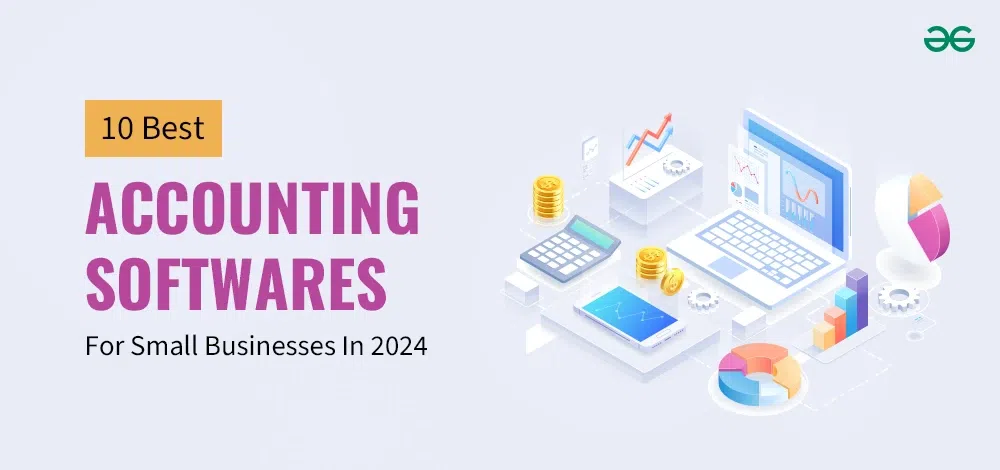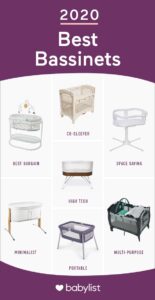Page Contents
ToggleTop 10 accounting software for small businesses include QuickBooks, FreshBooks, Xero, Zoho Books, and Wave. They help manage finances efficiently.
Small businesses need reliable accounting software to streamline financial tasks, including invoicing, expense tracking, and payroll. QuickBooks is a popular choice due to its comprehensive features and ease of use. FreshBooks offers user-friendly invoicing and expense management, ideal for freelancers and small business owners.
Xero provides robust accounting tools with strong integration capabilities. Zoho Books is perfect for businesses seeking affordability without compromising functionality. Wave offers free accounting software with essential features for startups. Choosing the right software can save time, reduce errors, and improve financial management, allowing business owners to focus on growth and success.
Introduction To Small Business Accounting Needs
Small businesses need effective accounting to thrive. Proper accounting helps track income, expenses, and ensure compliance with tax laws. With the right tools, small businesses can manage their finances efficiently and focus on growth.
Importance Of Effective Accounting
Effective accounting is crucial for any business. It provides insights into financial health. Small businesses must have clear records of income and expenses. Accurate accounting helps in budgeting, forecasting, and strategic planning.
Proper accounting ensures compliance with tax regulations. It minimizes the risk of audits and penalties. Effective accounting also builds trust with investors and stakeholders. A business with transparent financial records attracts more investment opportunities.
Evolving Accounting Software Landscape
The accounting software landscape is constantly evolving. Modern software solutions offer automation, integration, and cloud-based accessibility. Small businesses can now handle complex accounting tasks with ease.
Today’s accounting software provides features like invoicing, payroll, and expense tracking. Many solutions also offer real-time data and analytics. These tools help businesses make informed decisions quickly.
There are various options available, catering to different needs. Some software is designed for specific industries. Others offer customizable features to match unique business requirements.
Criteria For Selecting Accounting Software
Choosing the right accounting software for your small business is crucial. The ideal software should streamline your financial tasks, save time, and help you stay organized. Here are some key criteria to consider:
Ease Of Use
The ease of use of accounting software is vital. Small business owners often wear many hats and may not have an accounting background. Look for software with a user-friendly interface and clear instructions. Features like drag-and-drop, easy navigation, and simple reporting tools make a big difference.
- Intuitive interface
- Clear instructions
- Simple reporting tools
Cost Considerations
Cost is a significant factor for small businesses. Different accounting software solutions offer various pricing plans. Some charge monthly fees, while others have one-time purchase options. It’s essential to balance cost with the features offered.
| Software | Pricing Model | Cost |
|---|---|---|
| QuickBooks | Monthly | $25 – $150 |
| FreshBooks | Monthly | $15 – $50 |
| Xero | Monthly | $9 – $60 |
Scalability And Integration
Your business will grow, and your accounting software should grow with it. Consider software that offers scalability and can integrate with other business tools. Look for compatibility with payroll services, CRM systems, and e-commerce platforms.
- Scalability options
- Integration with other tools
- Compatibility with payroll services
These criteria will guide you in selecting the best accounting software for your small business. Choose wisely to ensure your financial management is seamless and efficient.
The Contenders For Top Accounting Software
Choosing the right accounting software can transform your small business. The right tool simplifies invoicing, expense tracking, and financial reporting. Here are the top contenders for the best accounting software:
Quickbooks: A Market Leader
QuickBooks is often the first choice for small businesses. It offers robust features and an intuitive interface. Many small businesses trust QuickBooks for their accounting needs.
Key features include:
- Customizable invoices
- Expense tracking
- Real-time financial reporting
- Third-party integrations
QuickBooks provides a scalable solution. It grows with your business, making it a reliable choice.
Xero: Connecting You To The Cloud
Xero stands out for its cloud-based functionalities. It allows you to manage your finances from anywhere. This flexibility is ideal for small business owners on the go.
Notable features of Xero include:
- Real-time bank reconciliation
- Inventory management
- Multi-currency support
- Mobile app access
Xero also integrates with many business apps. This helps streamline your operations and save time.
Freshbooks: Invoicing And Beyond
FreshBooks is known for its user-friendly invoicing capabilities. It goes beyond invoicing to offer a full suite of accounting tools.
Highlighted features of FreshBooks:
- Professional invoicing
- Time tracking
- Expense management
- Financial reporting
FreshBooks is designed for ease of use. Its interface is clean and straightforward, making it a favorite among freelancers and small business owners.
Free Accounting Solutions
Small businesses often seek cost-effective ways to manage their finances. Free accounting software solutions offer a great way to maintain your books without breaking the bank. Here, we explore top free options that can help you streamline your accounting tasks.
Wave: No-cost Accounting
Wave is a popular free accounting software designed for small businesses. It’s perfect for freelancers, consultants, and small business owners. With Wave, you can manage your finances without any cost.
- Invoicing: Create and send professional invoices.
- Receipts: Scan and organize receipts.
- Bank Connections: Connect your bank accounts for seamless tracking.
- Reports: Generate comprehensive financial reports.
Wave also offers optional paid services. These include payroll and payments, but the core accounting features remain free.
Zoho Books: Free Tier Offerings
Zoho Books provides a free plan for small businesses. This plan is ideal for businesses with revenue under $50,000 per year. Zoho Books helps you manage your finances efficiently without a hefty price tag.
| Feature | Details |
|---|---|
| Invoicing | Create up to 1,000 invoices per year. |
| Expense Tracking | Track and categorize your expenses. |
| Bank Feeds | Import transactions from your bank. |
| Reports | Generate detailed financial reports. |
The free tier of Zoho Books is robust and suitable for small businesses starting out. It covers essential accounting needs without any cost.
Accounting Software With Exceptional Features
Small businesses need robust accounting software to manage finances efficiently. These tools offer unique features to enhance productivity and streamline operations.
Netsuite: Comprehensive Business Management
NetSuite stands out with its comprehensive business management capabilities. It integrates various functions, making it a one-stop solution for small businesses.
Key features include:
- Financial management
- CRM
- Inventory management
- Order management
- HR management
NetSuite’s dashboard provides a real-time view of key performance metrics. This helps businesses make informed decisions quickly.
Gusto: Payroll Simplified
Gusto makes payroll processing simple and efficient. It’s perfect for small businesses needing a reliable payroll solution.
Key features include:
- Automated payroll
- Employee benefits management
- Time tracking
- Compliance support
Gusto also offers an intuitive interface. Users can easily navigate and manage payroll tasks without hassle.
User-friendly Accounting Platforms
Small businesses need user-friendly accounting software to manage their finances effectively. The right platform can save time, reduce errors, and streamline financial management. Below are some of the top accounting software that are easy to use for small businesses.
Sage: Streamlined Financial Management
Sage offers a simple interface for managing your business finances. It’s designed to help small businesses streamline financial tasks. Sage’s features include:
- Invoicing
- Expense tracking
- Payroll management
With Sage, you can automate repetitive tasks. This means less manual work and fewer mistakes. The dashboard is user-friendly, giving you a quick view of your financial health. Sage also integrates with other tools, making it versatile for different business needs.
Kashoo: Simplify Your Accounting
Kashoo is another excellent option for small business owners. It is known for its easy-to-use platform. Kashoo’s features include:
- Real-time data entry
- Bank reconciliation
- Expense categorization
Kashoo allows you to connect your bank accounts. This feature ensures that your financial data is always up to date. The interface is intuitive, making it easy for anyone to use. Kashoo also provides excellent customer support, ensuring you get help when needed.
| Feature | Sage | Kashoo |
|---|---|---|
| Invoicing | Yes | Yes |
| Expense Tracking | Yes | Yes |
| Payroll Management | Yes | No |
| Bank Reconciliation | No | Yes |
| Real-time Data Entry | No | Yes |
Both Sage and Kashoo offer features that can simplify your accounting processes. Their user-friendly interfaces make them ideal for small businesses.
Exploring Niche Accounting Tools
Accounting software for small businesses has come a long way, offering tailored solutions for specific needs. Some tools are designed to serve particular niches, making them invaluable for businesses with unique requirements. Below, we explore niche accounting tools that stand out for their specialized features and functionalities.
Oneup: Tailored For Sales-centric Businesses
OneUp is perfect for small businesses focused on sales. It integrates seamlessly with your sales processes, helping manage inventory, invoices, and CRM activities.
- Inventory Management: Keep track of stock levels and automate reorders.
- CRM Integration: Sync customer data and sales activities for better insights.
- Invoicing: Generate and send invoices quickly.
OneUp’s automation features reduce manual entry, saving time and reducing errors. It’s ideal for businesses that need to keep their sales and accounting tightly integrated.
Kashflow: Designed For Uk Businesses
KashFlow is tailored specifically for UK-based small businesses. It caters to local needs, ensuring compliance with UK tax laws and regulations.
| Feature | Description |
|---|---|
| Tax Compliance | Handles VAT and other UK-specific tax requirements effortlessly. |
| Payroll | Manages employee payments, ensuring compliance with UK payroll laws. |
| Bank Integration | Syncs with major UK banks for seamless transactions. |
KashFlow’s user-friendly interface makes it easy for non-accountants to navigate. It offers robust support and training for new users, ensuring a smooth transition.

Credit: callhippo.com
Comparing Pricing Models
Understanding the pricing models of accounting software is crucial for small businesses. Different software providers offer various pricing structures. This section will help you compare the most common pricing models: Subscription and One-Time Payment. Additionally, we will look into Additional Costs for Add-Ons.
Subscription Vs One-time Payment
When choosing accounting software, you will often encounter two main pricing models: Subscription and One-Time Payment.
Subscription-based pricing usually involves monthly or yearly payments. This model often includes updates and customer support. It allows businesses to spread costs over time.
| Software | Subscription Cost | Features Included |
|---|---|---|
| QuickBooks Online | $25/month | Invoicing, Expense Tracking, Payroll |
| FreshBooks | $15/month | Time Tracking, Invoicing, Payments |
| Xero | $11/month | Bank Reconciliation, Invoicing, Inventory |
On the other hand, One-Time Payment models involve a single upfront cost. This often appeals to businesses with a longer-term view. They don’t have to worry about recurring payments.
| Software | One-Time Cost | Features Included |
|---|---|---|
| Sage 50 | $299 | Invoicing, Inventory, Payroll |
| QuickBooks Desktop | $299.95 | Expense Tracking, Invoicing, Inventory |
| AccountEdge Pro | $399 | Bank Reconciliation, Invoicing, Payroll |
Additional Costs For Add-ons
Many accounting software providers offer additional features or add-ons. These can enhance the basic functionalities of the software. However, they often come at an extra cost.
- Payroll Services: This is a common add-on. It usually costs extra.
- Advanced Reporting: Some software offers advanced reporting tools. These may require an additional fee.
- Cloud Storage: Increased cloud storage options often come with extra charges.
Let’s consider the additional costs for popular software:
| Software | Add-On | Additional Cost |
|---|---|---|
| QuickBooks Online | Payroll Services | $45/month |
| FreshBooks | Advanced Payments | $20/month |
| Xero | Project Tracking | $7/month |
Understanding these pricing models can help you make an informed decision. Choose the accounting software that best fits your small business needs and budget.
Customer Support And Community
When choosing the best accounting software for your small business, Customer Support and Community play a crucial role. The level of support you receive and the communities available can significantly impact your experience and efficiency. This section delves into the importance of customer service accessibility and the wealth of online communities and resources.
Accessibility Of Customer Service
Having accessible customer service can make or break your experience with accounting software. QuickBooks offers 24/7 live chat support, ensuring you can get help anytime. FreshBooks provides email and phone support during business hours, which is ideal for resolving urgent issues.
Here’s a table summarizing the customer service accessibility for some top accounting software:
| Software | Customer Service Hours | Support Channels |
|---|---|---|
| QuickBooks | 24/7 | Live Chat, Phone |
| FreshBooks | Business Hours | Email, Phone |
| Xero | 24/7 | Email, Live Chat |
Online Communities And Resources
Online communities and resources can be invaluable. They provide support, share experiences, and solve common issues. Xero has an extensive community forum where users share tips and troubleshoot problems. Zoho Books offers a comprehensive resource center with webinars, user guides, and FAQs.
Here are some benefits of active online communities:
- Access to real-world advice from experienced users
- Quick solutions to common problems
- Networking opportunities with other business owners
Active online communities can enhance your software experience significantly.
Making The Decision
Choosing the right accounting software for your small business can be daunting. With numerous options available, it’s crucial to consider your unique business needs. Below, we discuss key steps to help you make an informed decision.
Assessing Your Business’s Unique Needs
Every small business has different requirements. Start by identifying your specific needs:
- Budget: Determine how much you can spend on accounting software.
- Features: List the must-have features like invoicing, payroll, and tax filing.
- Scalability: Consider if the software can grow with your business.
- Ease of use: Ensure the software is user-friendly for your team.
- Customer support: Check if they offer reliable customer service.
Once you have a clear understanding, you can narrow down your options. For example, if invoicing is critical, you might prioritize software with robust invoicing features.
Taking The Leap With A Free Trial
Most accounting software offers a free trial. This is a great opportunity to test the software:
- Sign up: Register for the free trial on the software’s website.
- Explore features: Test all the features you need to see if they meet your expectations.
- Evaluate ease of use: Ensure the interface is intuitive and easy to navigate.
- Check customer support: Contact their support team with any queries to gauge responsiveness.
During the trial, involve your team and gather their feedback. This collective input can help you decide if the software fits your business.
Remember, taking advantage of a free trial can save you from investing in the wrong software.
Future Trends In Accounting Software
Small businesses need the best accounting software to stay competitive. As technology evolves, so does accounting software. Keeping up with future trends can help businesses save time and reduce errors.
Ai And Automation
Artificial Intelligence (AI) and automation are transforming accounting software. These technologies automate repetitive tasks like data entry and reconciliation. This reduces human error and frees up time for strategic activities.
AI can analyze large datasets quickly. It identifies trends and provides valuable insights. This helps businesses make informed decisions faster. Automated workflows streamline processes, ensuring efficiency and accuracy.
| Feature | Benefit |
|---|---|
| AI Data Analysis | Quick trend identification |
| Automated Workflows | Increased efficiency |
| Error Reduction | Improved accuracy |
The Rise Of Mobile Accounting
Mobile accounting is becoming essential for small businesses. It offers flexibility and convenience. Business owners can manage finances on the go using smartphones or tablets.
Mobile apps provide real-time access to financial data. Users can send invoices, track expenses, and even receive payments from anywhere. This increases productivity and ensures timely financial management.
- Real-time access to financial data
- Send invoices and track expenses on the go
- Receive payments from anywhere
Security is also a priority in mobile accounting. Apps use encryption to protect sensitive information. This ensures that financial data is safe and secure.

Credit: ifeeltech.com
Final Thoughts
Choosing the right accounting software can be a game-changer for small businesses. With numerous options available, it’s essential to find one that fits your needs and budget. Here are some final thoughts to consider.
The Impact On Small Business Operations
Accounting software can significantly enhance small business operations. It automates complex tasks, reducing manual errors and saving time. This efficiency allows business owners to focus more on growth and strategy.
Consider the following impacts:
- Financial Accuracy: Automated calculations minimize errors.
- Time Management: Streamlined processes save valuable time.
- Data Security: Secure platforms protect sensitive information.
Continual Adaptation And Learning
Technology evolves rapidly, and accounting software is no exception. Small businesses must stay updated with the latest features and updates. Regular training ensures the team can use the software effectively.
Here are some tips for continual adaptation:
- Regular Updates: Ensure your software is always up-to-date.
- Training Sessions: Schedule frequent training for your team.
- Customer Support: Utilize available customer support resources.
Choosing the right accounting software and staying adaptable can lead to significant business success.

Credit: www.ifourtechnolab.com
Frequently Asked Questions
What Is The Most Used Accounting Software?
QuickBooks is the most used accounting software. It is popular for its user-friendly interface and comprehensive features.
What Is The Easiest Accounting System To Use?
QuickBooks Online is widely regarded as the easiest accounting system to use due to its user-friendly interface.
How Much Does Accounting Software Cost For A Small Business?
Accounting software for small businesses typically costs between $10 and $60 per month, depending on features and providers.
Which Accounting Program Has No Monthly Fee?
Wave offers an accounting program with no monthly fee. It is free to use for basic accounting needs.
What Is The Best Accounting Software?
The best accounting software varies based on business needs. Popular choices include QuickBooks, Xero, and FreshBooks.
How Does Accounting Software Help Small Businesses?
It automates financial tasks, improves accuracy, and saves time. It also provides valuable insights into business performance.
Is Cloud-based Accounting Software Secure?
Yes, most cloud-based accounting software uses encryption and other security measures to protect your data.
Can Accounting Software Handle Payroll?
Yes, many accounting software options include payroll features, making it easier to manage employee payments and taxes.
Conclusion
Selecting the right accounting software can greatly benefit your small business. Each option on our list offers unique features. Evaluate your specific needs to find the best fit. Remember, the right tool can streamline finances and boost productivity. Choose wisely to ensure financial success and growth for your business.



